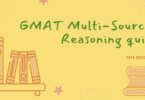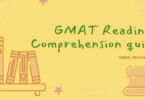If you’re setting your sights on business school, you’ve likely encountered the GMAT. But you may have also heard about its modern successor: the GMAT Focus Edition. Designed to be a more efficient, flexible, and targeted test, the GMAT Focus Edition is the new standard for assessing the skills most relevant to today’s business landscape.
This guide will walk you through everything you need to know about this streamlined exam, from its structure and content to why it might be the right choice for your business school journey.
What is the GMAT Focus Edition?
The GMAT Focus Edition is a newer, condensed version of the Graduate Management Admission Test. It was created to better evaluate the higher-order critical thinking and data literacy skills that business schools value most. It’s shorter, more focused, and introduces a new section while removing others, reflecting a shift in the demands of modern MBA programs.
Most importantly, both the traditional GMAT and the GMAT Focus Edition are accepted by business schools, giving candidates the flexibility to choose the format that best suits their strengths.
GMAT Focus Edition vs. The Traditional GMAT: Key Changes
The GMAT Focus Edition introduces several significant changes designed to create a better testing experience. Here are the most important differences:
- Test Duration: The total exam time is just 2 hours and 15 minutes, a significant reduction from the 3 hours and 7 minutes of the traditional GMAT.
- Number of Sections: The exam is streamlined into three sections instead of four.
- No Essay: The Analytical Writing Assessment (AWA), or essay section, has been completely removed.
- New Section: A new Data Insights section replaces the Integrated Reasoning and parts of the Quantitative section, focusing on digital and data literacy.
| Feature | GMAT Focus Edition | Traditional GMAT |
| Total Time | 2 hours 15 minutes | 3 hours 7 minutes |
| Sections | 3 (Quant, Verbal, Data Insights) | 4 (AWA, IR, Quant, Verbal) |
| Essay (AWA) | No | Yes |
| Focus | Data literacy & critical reasoning | Broader skill assessment |
A Deep Dive into the GMAT Focus Sections
The GMAT Focus Edition tests your abilities across three core areas. Let’s break down what to expect in each section.
1. Quantitative Reasoning
This section measures your ability to solve problems and reason with quantitative information. Unlike the traditional GMAT, it does not include Data Sufficiency questions, focusing entirely on Problem Solving. You’ll need a solid understanding of arithmetic, algebra, and geometry to succeed.
2. Verbal Reasoning
The Verbal Reasoning section evaluates your ability to read and understand written material and evaluate arguments. This section now focuses on Reading Comprehension and Critical Reasoning, testing your ability to analyze arguments, identify assumptions, and draw logical inferences. Sentence Correction questions have been removed.
3. Data Insights
This is the newest section and a core component of the GMAT Focus Edition. It measures your ability to analyze and interpret data to make informed business decisions. It combines skills previously tested in the Integrated Reasoning and Data Sufficiency sections. You will be asked to synthesize information from various sources like graphs, tables, and text to solve complex problems.
The question types include:
- Data Sufficiency: Determine if the data provided is sufficient to answer a question.
- Multi-Source Reasoning: Synthesize data from multiple sources (tabs, charts).
- Table Analysis: Sort and analyze data in a spreadsheet-like table.
- Graphics Interpretation: Interpret information from various types of graphs.
- Two-Part Analysis: Solve complex problems with two related components.
Ready to put your knowledge to the test? Try our Sample GMAT Focus Mock Test to see how you score!
Why Choose the GMAT Focus Edition?
For many candidates, the GMAT Focus Edition offers several advantages:
- Shorter Test Day: With no essay and a shorter runtime, the exam is less fatiguing.
- More Relevant Content: The focus on data insights directly reflects the analytical skills needed in modern business.
- Increased Flexibility: You can answer questions in any order within a section and are allowed to bookmark and review as many questions as you like.
How to Register for the GMAT
Registering for the GMAT Focus Edition is a straightforward process. Follow these steps to get started:
- Create an Account: Visit the official GMAT website, mba.com, and create a personal profile.
- Choose Your Test Format: Decide whether you want to take the GMAT Focus Edition at a designated test center or online from home.
- Select a Date and Location: Browse available test dates and locations. It’s best to book your exam at least two to three months in advance to secure your preferred slot and allow ample time for preparation.
- Pay the Registration Fee: The fee can vary by location. The website will show the exact amount for your region, which you can pay via credit card or other available methods.
- Confirm and Prepare: After payment, you’ll receive a confirmation email with all the necessary details for your test day. Be sure to read it carefully, especially the instructions regarding required identification.
Essential GMAT Study Tips for Beginners
- Take a Diagnostic Test: Before you begin studying, take a full-length, official GMAT Focus practice test. This will provide a baseline score and pinpoint your strengths and weaknesses across the three sections.
- Create a Targeted Study Plan: Based on your diagnostic results, create a realistic and structured study plan. Allocate more time to your weaker areas while still reinforcing your strengths.
- Master the Fundamentals: The GMAT Focus Edition tests core concepts in complex ways. Revisit the fundamentals of arithmetic, algebra, and grammar rules. A strong foundation is critical for tackling harder questions.
- Practice Consistently and Analyze Mistakes: Regular practice is essential for success. Don’t just answer questions—take the time to understand why you got a question wrong. This deep analysis is key to improving your score.
- Familiarize Yourself with the Format: Get comfortable with the computer-adaptive format and the specific question types in the Data Insights section. Use the official GMAT prep materials to simulate the real test experience.
Key Takeaways
- A More Efficient Test: The GMAT Focus Edition is a shorter, three-section exam (Quantitative, Verbal, Data Insights) that takes 2 hours and 15 minutes to complete.
- No More Essay: The Analytical Writing Assessment (AWA) has been completely removed, allowing you to focus on core quantitative and verbal reasoning skills.
- Data Insights is Crucial: This new section measures your ability to analyze data from multiple sources and is a key indicator of your readiness for modern business programs.
- A Diagnostic Test is Your Starting Point: Use an official practice test to get a baseline score and create a personalized study plan that targets your weaknesses.
- Consistent Practice is Key: Success on the GMAT Focus comes from mastering fundamental concepts and consistently analyzing your mistakes to improve.
Conclusion
Embarking on your GMAT journey is a significant step toward achieving your business school ambitions. The GMAT Focus Edition is a challenging yet manageable test. By understanding its structure, creating a dedicated study plan, and practicing consistently, you can develop the skills and confidence needed to earn a great score. Remember, the GMAT is more than just a number—it’s your opportunity to demonstrate that you are ready for the academic rigor of a top-tier management program.
Frequently Asked Questions (FAQ)
1. How long is the GMAT Focus Edition?
The exam is 2 hours and 15 minutes, with three 45-minute sections.
2. Is the GMAT Focus Edition easier than the old GMAT?
It’s not necessarily “easier,” but it is more focused. The content is tailored to skills that are highly relevant to business schools, which may align better with some test-takers’ strengths.
3. Do business schools prefer one version over the other?
No. Business schools accept scores from both the GMAT Focus Edition and the traditional GMAT without preference.
4. How long are GMAT Focus Edition scores valid?
Scores are valid for five years from your exam date.
5. How should I prepare?
Start with a diagnostic test to identify your weaknesses. Focus your study plan on the three sections, paying special attention to the integrated nature of the Data Insights section. Use official prep materials to get familiar with the new format and question types.




